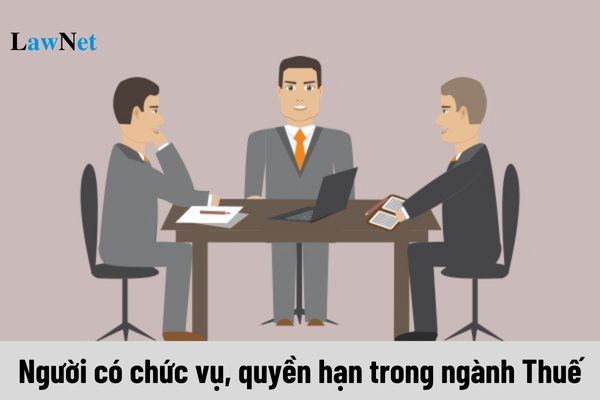Who are the office holders in the taxation in Vietnam?? What Are the Codes of Conduct?
Who are the office holders in the taxation in Vietnam?
Pursuant to the provision in Clause 9, Article 2 of the Regulations on Anti-Corruption in the taxation issued together with Decision 742/QD-TCT in 2020, it explains that office holders in the taxation are officials and public employees within, and directly affiliated with, tax offices at various levels.
These tax offices include: the General Department of Taxation; Tax Departments in provinces and centrally-run cities; Tax Sub-Departments in districts, towns, district-level towns, cities, and regional Tax Sub-Departments (collectively referred to as district-level Tax Sub-Departments) affiliated to provincial-level Tax Departments. (According to Clause 17, Article 2 of the Regulations on Anti-Corruption in the taxation issued together with Decision 742/QD-TCT in 2020).

Who are the office holders in the taxation in Vietnam? (Image from the Internet)
what are the codes of conduct for office holders in the taxation in Vietnam?
The codes of conduct for office holders in the taxation are defined in Clause 1, Article 14 of the Regulations on Anti-Corruption in the taxation issued together with Decision 742/QD-TCT in 2020. To be specific:
[1] office holders in an agency, organization, or unit must not engage in the following activities:
- Harassment in work resolution;
- Establishing, participating in management, operating private enterprises, limited liability companies, joint-stock companies, partnerships, cooperatives unless otherwise stipulated by the law;
- Advising businesses, organizations, or individuals domestically and internationally on work related to state secrets, operational secrets, tasks within authority to resolve or participate in resolution;
- Establishing, holding titles, managing, operating private enterprises, limited liability companies, joint-stock companies, partnerships, cooperatives in fields they previously had management responsibility for, within a timeframe as stipulated by the Government of Vietnam;
- Unauthorized use of an agency's, organization's, or unit's information;
- Other activities that office holders are not permitted to engage in as per the Law on Cadres, Officials 2008, Law on Public Employees 2010, Law on Enterprises 2020, and other relevant laws.
[2] Heads and deputy heads of agencies, organizations, or units must not position their spouses, parents, children, siblings, or in-laws in roles managing personnel organization, accounting, as treasurers, storekeepers in the agency, transaction handlers, goods and service sellers, or contract signatories for the agency or unit.
[3] Heads and deputy heads of agencies must not invest in enterprises operating in sectors, industries directly under their state management or allow their spouses, parents, or children to conduct business in sectors, industries under their direct state management.
Note: Implement seriously and completely the regulations on codes of conduct; what officials and public employees must not do; obligations to report and responsibilities of those who do not report or handle reports on corruption signs; regarding the giving and receiving of gifts by officials and public employees; professional ethical rules as per the Anti-Corruption Law, guiding documents from competent authorities, and sector-specific guidelines related to anti-corruption work. (According to Clause 2, Article 14 of the Regulations on Anti-Corruption in the taxation issued together with Decision 742/QD-TCT in 2020)
What are regulations on classification of state secrets in Vietnam?
Pursuant to Article 8 of the Law on Protection of State Secrets 2018 on the classification of state secrets as follows:
Based on the importance of information content, the degree of threat if leaked or lost, state secrets are classified into three levels, including:
[1] Top Secret state secrets relate to politics, national defense, security, cryptography, foreign affairs, if leaked or lost, it could cause particularly serious harm to national and ethnic interests;
[2] Confidential state secrets relate to politics, national defense, security, cryptography, constitution, legislation, judiciary, foreign affairs, economy, resources and environment, science and technology, education and training, culture, sports, information and communications, health, population, labor, society, organization, personnel, inspection, monitoring, violation handling, complaint resolution, denunciation and anti-corruption, state audit, if leaked or lost, it could cause very serious harm to national and ethnic interests;
[3] Secret state secrets relate to politics, national defense, security, cryptography, constitution, legislation, judiciary, foreign affairs, economy, resources and environment, science and technology, education and training, culture, sports, information and communications, health, population, labor, society, organization, personnel, inspection, monitoring, violation handling, complaint resolution, denunciation, and anti-corruption, state audit, if leaked or lost, it could cause serious harm to national and ethnic interests.

